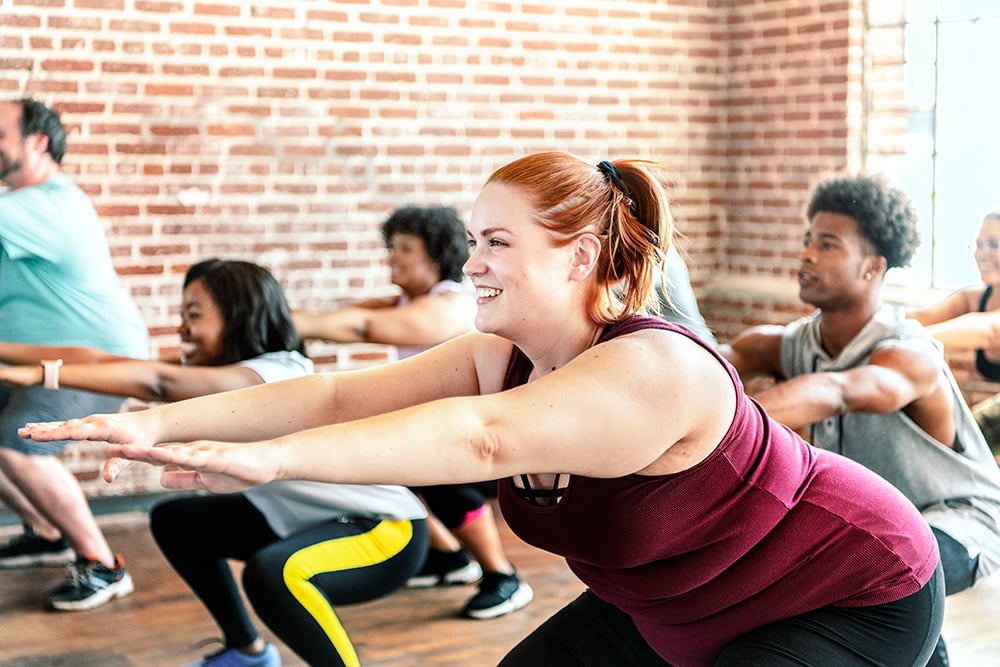A guide on how to start your own gym
What’s better than working up a sweat, pumping some iron, or getting in some essential cardio at a fitness studio? Turning that love of workouts into dollars. If you’re a physical fitness enthusiast hoping to turn your passion into a career, there’s no better way than starting your own gym business.
So how do you turn your interest in physical activity into a full-fledged fitness business? Careful planning, dedication, and some need-to-know knowledge.
From fitness industry certifications to cardio equipment purchasing, this guide will take you through all there is to know about starting your own gym franchise. Whether you’re ready to realize your dreams or curious about what it takes, read on to learn how to get started.
Prioritize your financing
Before you can start building muscle for your clientele, you’ll need to build up your finances. So, how much does it cost to open a gym?
Calculate your gym start-up costs before seeking funding. A smaller independent gym may cost $20,000, while a larger gym franchise in a more expensive city could cost 10-times that amount. Not only that, you’ll want more than just the initial seed money, you’ll also want cash left over for unexpected expenses and general operating costs. After all, fitness trends is a 30 billion dollar industry, and you should expect to invest a serious amount of capital, to create a stable and sustainable business in the fitness industry. When calculating your start-up costs for your gym, keep in mind the following:
- Property costs – To be successful, you’ll need to either buy or rent a space for your gym. This will probably be your biggest expense and will vary based on the size of your space. If you decide to rent, keep in mind the up-front cost will be much less, but will increase your monthly costs for your business.
- Legal Fees – Before your gym is up and running, you’ll need to handle some legal paperwork. You’ll need to pay for insurance, a business license, and registration.
- Gym Equipment – Perhaps the most important part of any gym is the equipment. This will most likely be your second biggest expense when opening your gym, so choose wisely. Think about what type of gym or fitness center you want to run and go from there. This way, you won’t be purchasing equipment that you don’t need.
- Staff – To run a successful gym, you will want to hire at least a handful of employees. This will take a lot of stress out of managing your space, however, you’ll need to think about how much you’ll pay each employee. Keep in mind that experienced trainers will cost you more, but will also bring in more gym members.
Once you have an understanding of how much you’ll need to start your gym, you’ll need to obtain those funds. To acquire the necessary start-up cost for your business, consider the following financing options:
- Business plan – A gym business plan will outline your fitness center services, profit expectations, daily operations, and long-term goals. Your plan will thoroughly display why your business will be successful and how your funds will be used. A solid business plan is often the key to unlocking financing and loan options for a small business.
- Financial partners – A future gym owner may find more success in financing by taking on business partners. These partners will contribute funds and help financially back the business, often in exchange for a portion of the profits as well as some amount of control over the business itself.
- Self-financing – If you have a large sum of money in your personal account, real estate assets, or other businesses to borrow against, it may be worthwhile to consider financing your gym yourself. By taking on the gym’s financing, you can avoid interest-accruing loans and profit-sharing with potential partners. While this route of financing may be more demanding and riskier, it offers serious rewards for those with the wherewithal.
Acquire permits, insurance, and licenses
You may be required to petition your city or state for proper licensing for your new business and file for insurance to protect yourself from potential liabilities.
It’s important to note that new gyms require:
- Business license – Gyms are not federally regulated, so you shouldn’t have to worry about any specialty licensing. That said, most states and cities issue business licenses for anyone operating a for-profit enterprise in a commercially-regulated zone. Check your local and state guidelines to assure your business is compliant with your specific licensing laws.
- Insurance – From general liability insurance to specialized gym insurance, coverage is a must-have. You can always be proactive by dedicating your gym to clean and safe protocols to avoid injury, but in the case that something does happen, you want to make sure you and your business are protected. Find a policy that works for you and consider your options before signing a contract—there are plenty of options for every business. Some companies that offer gym insurance include Progressive, Nationwide, The Hartford, and CoverWallet.
- Specialized permits – If you plan to sell food, provide childcare, or offer specialized esthetician services, you may require additional permits to operate. These services are often regulated and enforced by various government bodies, meaning you’ll need to fulfill the various standards (sanitization, safety, etc.) to comply.
Pools, saunas, and other spa facilities may also require various permits and safety regulations to operate. While it may seem like a lot of red-tape to begin your gym, it’s more than worth it to figure out the logistics and legalities before you attempt to open—the health department takes things pretty seriously.
Earn certifications
If you have a certificate from a respected and accredited health agency, it can certainly help boost the reputation of your new gym.
Some potential options for certification include:
- American Council on Exercise
- National Academy of Sports Medicine
- Athletics and Fitness Association of America
- American Fitness Professionals and Associates
Add to your credibility by gaining various certifications from these nationally recognized organizations, and you’ll add another layer of legitimacy to your gym.
Choose your location
Where your gym or fitness studio operates is almost as important as how it operates. Choosing a location that’s both convenient for you and your customers while avoiding overpriced real estate is a skill of its own.
When scouting out potential locations for your gym, be sure to consider the following factors:
- Zoning laws – Certain states may permit you to operate within a residential zone. That said, if your business causes a disturbance for the residents (noise, traffic), you may face fines and penalties. You may have better luck positioning your new gym firmly in a commercial zone.
- Proximity to other gyms – You should always keep a close eye on your competition, though that doesn’t mean you should always be close to your competition. Building your gym near another operating gym may make it harder to attract a unique customer base—consider checking the map for what businesses are near your proposed location to ensure you won’t have another gym vying for your customers.
- Long-term potential – Choosing a location in the heart of downtown may command a high level of rent but may be worth the price in the long run. Determine where your business will be 1 year, 5 years, or even 10 years in the future. If you see yourself opening multiple locations or expanding on your original, carefully consider what spaces offer the most long-term opportunity.
Ultimately, financial costs like rent, utilities, and renovations will be the most decisive factors when choosing a location. That said, you may find a creative way to repurpose the space to your specifications. Tom Delcamp, owner of the Westfield New York gym, Westwind Functional Fitness decided to lease a 3,100 square foot industrial building and repurpose it into a CrossFit gym.
There are options for innovation around every corner when opening a gym.
Invest in fitness equipment and quality staffing
Before you can open your doors, you’ll need the essential pieces of a functioning gym: proper gym equipment and dedicated gym staff.
When it comes to purchasing fitness equipment, hone in on what is most important for your prospective gym members, and consider options such as:
- Broad range – Cardio machines, free weights, stretching equipment, and endurance focus machines. If you’re looking to create a fully-rounded fitness experience, you’ll need to invest in equipment that fulfills a variety of needs.
- Body-building – If you’re looking to attract a customer base most interested in putting on mass and sculpting their bodies, you might focus more specifically on bench presses, barbells, and heavyweight machines. Give your clients the options to maximize their gains with multiple high-weight options.
- Non-traditional – If you’re looking to start a nontraditional gym—such as a boxing gym or a CrossFit gym—you’ll be investing in a slightly different variety of equipment. That said, the same holds true for all gyms: maximize equipment usage and minimize wait times.
You’ll also want to hire a gym staff that’s knowledgeable and proficient when it comes to the equipment in your gym. It may even be helpful to begin your hiring process simultaneously with your equipment buying process.
There are many roles to fill when hiring staff for your gym, including:
- Custodial services
- Front-desk and office administrators
- Personal trainers
- Managers
- Payroll, taxes, and finances
If you’re running a fairly small operation, you may end up fulfilling multiple roles yourself. Huntsville, Alabama gym owner, DeWayne Morris not only runs his gym but also offers personal training nearly every day of the week. As he says, “I’m a fitness person that’s in business, not a businessman that’s into fitness, I care about my clients, I’m here at 4:45 a.m. every day and I don’t leave till 8 or 9 at night.”
Diversifying your gym's offerings through various membership models can significantly enhance your appeal to different customer segments, catering to both budget-conscious individuals and those seeking premium experiences.
Membership Models
Offering various gym membership models can also help attract different customer segments. Consider tiered memberships that provide access to different services or facilities. For example, a basic membership might include access to standard gym equipment and facilities, while a premium membership could offer additional perks like personal training sessions, exclusive classes, or spa services. Group classes and packages designed for specific fitness goals can further appeal to niche markets, such as those focused on weight loss, strength training, or endurance.
Refine your marketing
Once you’ve checked all the steps listed above, it’s time to get the word out and attract new customers to your small business . Start letting the public know about your gym far before you ever open it. Gym marketing is your primary tool to build buzz around your new gym, so don’t wait until the last minute to start developing your fitness marketing materials.
Some simple ways to begin marketing your business to prospective customers include:
- Early sign-up bonus – Give the public a reason to be at your gym the day it opens. An early sign-up bonus may be a monthly discount or a free personal training session, anything that might encourage a new customer to join your gym ASAP.
- Connect - Connect locally and establish your business’s online presence with a Nextdoor Business Page . Claiming your page will allow you to reach potential customers nearby, post important business information (like your grand opening date), and make it convenient for neighbors to reach you directly with questions about your business. Once your gym officially opens, customers can also leave recommendations for your business.
- Establish your brand – Create visual and written marketing materials that communicate exactly what your gym represents clearly and concisely. Are you a gym dedicated to serving older fitness enthusiasts looking to stay in shape or are you the perfect gym for those looking to push the limits of their body in high endurance exercise? Work to discover the best way to let your audience know who you are.
Gym Management Software
In today's digital age, effective gym management relies heavily on technology. Gym management software is an essential tool that can streamline your operations, improve the member experience, and track business performance. This software can handle a wide range of tasks, from scheduling fitness classes and managing memberships to processing payments and monitoring attendance. It can also offer insights into your business, such as membership trends and revenue forecasts, allowing for better careful planning and decision-making.
Bring your gym to Nextdoor
Now that you know a bit about how to start a gym, you’re probably ready to start putting in the work to make your dreams of physical fitness entrepreneurship a reality. If you’re looking for a way to share your passion with your community, it’s time to connect on Nextdoor. Claim your Business Page to start reaching customers nearby and build buzz around your new business.
Sources:
- Chron. How to Start My Own Gym Business. https://smallbusiness.chron.com/start-own-gym-business-4854.html
- The Post-Journal. Westfield Man Opens Functional Fitness Gym. https://www.post-journal.com/news/local-news/2021/09/westfield-man-opens-functional-fitness-gym/
- WHNT. A local gym heats things up while you warm up and cool down. https://whnt.com/community/wellness-wednesday/a-local-gym-heats-things-up-while-you-warm-up-and-cool-down/







